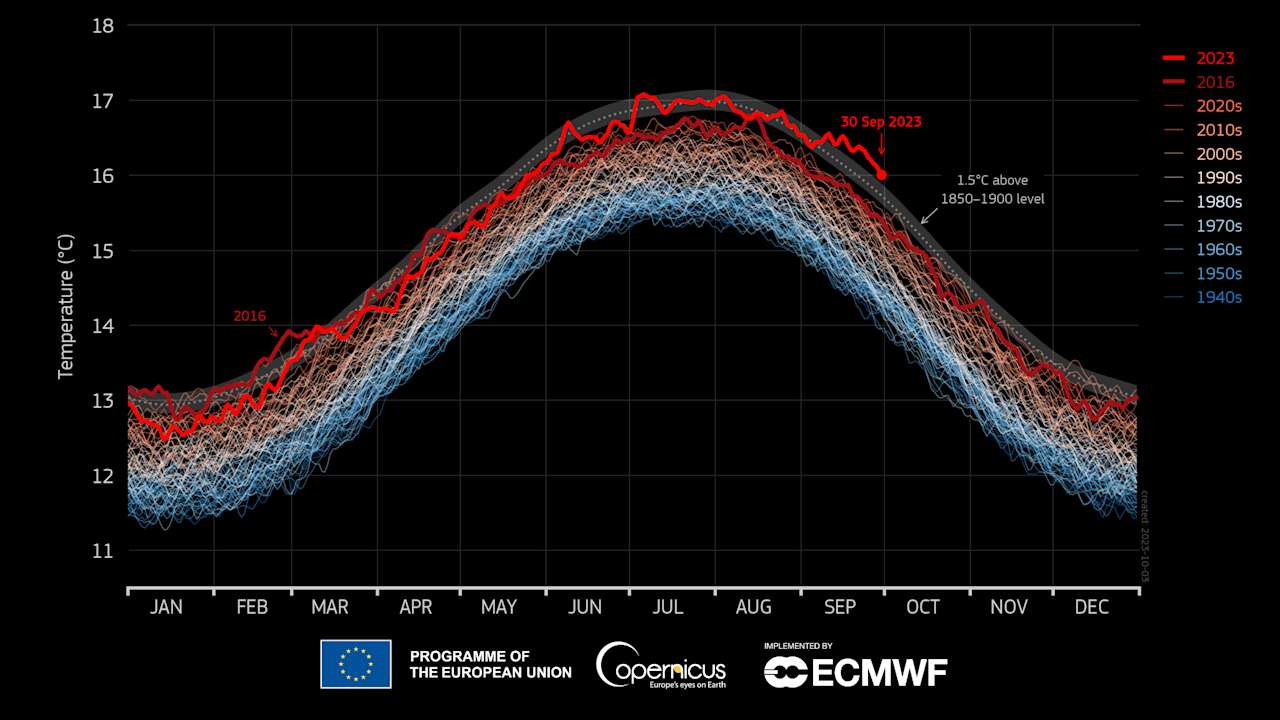This September is the biggest jump above a month’s average in 83 years, ITV News Correspondent John Ray reports
It was the hottest September on record around the world last month, according to the European Union’s Climate Change Service.
Temperatures were 0.93 Celsuis above the average for the same month between 1991-2020, as wildfires in Europe have become more common.
A leading climate scientist has described the planet’s record September heat as “gobsmackingly bananas”.
This September is the biggest jump above a month’s average in 83 years – since the European Space Agency’s Copernicus Climate Change Service’s records began.
“It’s just mind-blowing really,” said Copernicus Director Carlo Buontempo. “Never seen anything like that in any month in our records.”
While July and August had higher temperatures because they are warmer, summer months, September had what scientists call the biggest anomaly.

“This is not a fancy weather statistic,” Imperial College of London climate scientist Friederike Otto said in an email. “It’s a death sentence for people and ecosystems. It destroys assets, infrastructure, harvest.”
Copernicus calculated the average temperature for September was 16.38 degrees Celsius, which broke the old record set in September 2020 by a half-degree Celsius.
While that may seen small, it’s a huge margin in climate records.
Scientist have put the heat down to the ocean’s being persistent and unusually warm.
This year they did not cool as much as normal in September and have been record hot since spring, said Mr Buontempo.

Earth is on track for its hottest year on record, about 1.4 degrees Celsius warmer than pre-industrial times, according to Samantha Burgess, Copernicus’ deputy director
This past September was 1.75 degrees Celsius (3.15 degrees Fahrenheit) warmer than the mid-1800s, Copernicus reported.
World leaders agreed in 2015 to try to limit future warming to 1.5 degrees Celsius warming since pre-industrial times.
While this global threshold goal is for long-term temperature averages, not a single month or year, scientists still expressed grave concern at the records being set.
What’s causing the warming
Though El Nino is playing a part, climate change has a bigger impact on this warmth, Buontempo said.
“What we’re seeing right now is the backdrop of rapid global warming at a pace that the Earth has not seen in eons,” said US climate scientist Jessica Moerman, who is also president of the Evangelical Environmental Network.
Ms Moerman said this coupled with El Nino – the temporary warming of parts of the Pacific Ocean that changes weather worldwide – has contributed to the record breaking temperatures.
“This double whammy together is where things get dangerous,” she added.
Buontempo said El Nino is likely to get warmer and cause even higher temperatures next year.
“This month was, in my professional opinion as a climate scientist – absolutely gobsmackingly bananas,” climate scientist Zeke Hausfather said on X, formerly known as Twitter.
Follow STV News on WhatsApp
Scan the QR code on your mobile device for all the latest news from around the country






























